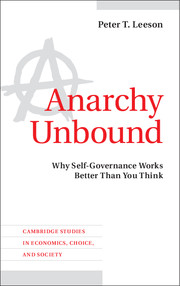Book contents
- Frontmatter
- Dedication
- Contents
- Acknowledgments
- 1 Anarchy Unbound
- Part I Self-Governance and the Problem of Social Diversity
- Part II Self-Governance and the Problem of Violence
- Part III Self-Governance and the Problem of “Bad Apples”
- Part IV Self-Governance as Superior to the State
- 8 Efficient Anarchy*
- 9 Better Off Stateless*
- 10 An Argument for Anarchy in LDCs*
- 11 A Future for Thinking about Self-Governance*
- References
- Index
- References
11 - A Future for Thinking about Self-Governance*
Published online by Cambridge University Press: 05 February 2015
- Frontmatter
- Dedication
- Contents
- Acknowledgments
- 1 Anarchy Unbound
- Part I Self-Governance and the Problem of Social Diversity
- Part II Self-Governance and the Problem of Violence
- Part III Self-Governance and the Problem of “Bad Apples”
- Part IV Self-Governance as Superior to the State
- 8 Efficient Anarchy*
- 9 Better Off Stateless*
- 10 An Argument for Anarchy in LDCs*
- 11 A Future for Thinking about Self-Governance*
- References
- Index
- References
Summary
In the course of arguing that anarchy works better than you think, this book has elaborated two basic themes. First, individuals who are unable or unwilling to rely on government to facilitate social cooperation find their own, often surprising ways to do so, even in situations where we might expect it least, such as where the discipline of continuous dealings alone is insufficient to produce cooperation (Parts I–III). Second, in some cases at least, the mechanisms of self-governance those individuals develop for this purpose may be capable of producing more social cooperation, and thus a superior level of welfare, than their realistic government alternative could produce if it were relied on instead (Part IV). Together these themes suggest that significantly more optimism about anarchy, and significantly more pessimism about government, as governance alternatives is in order.
In this concluding chapter I hope to underscore these themes by considering two examples of a class of self-governing mechanisms I have until now neglected: self-governing mechanisms rooted in superstition – that is, objectively false beliefs. Superstition-based mechanisms of self-governance are especially useful for emphasizing the dual themes pointed to earlier, for two reasons. First, their “exoticness” highlights the incredible ingenuity of persons in anarchy to develop self-governing solutions to the problems of social cooperation they confront, and the incredible variety of self-governing manifestations that ingenuity can take, in particular when the discipline of continuous dealings by itself is of little or no avail. Second, while previous chapters discussed how self-governance can in some cases outperform its relevant government alternative, it should be especially surprising to most readers to find superstition-based self-governance doing so precisely because this self-governance is grounded in what would appear to be the flimsiest of foundations: objectively false thinking. Suggesting, as I intend to do, that even superstition-based self-governance can outperform its relevant government alternative should therefore supply particularly powerful evidence of self-governance's potential to produce better outcomes than the state.
- Type
- Chapter
- Information
- Anarchy UnboundWhy Self-Governance Works Better Than You Think, pp. 211 - 226Publisher: Cambridge University PressPrint publication year: 2014



